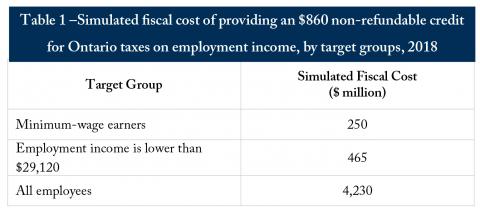From: Alexandre Laurin
To: The new Ontario Government
Date: June 22, 2018
Re: How Could a Tax Credit Work for Ontario’s Minimum Wage Workers?
The widely held view in economics is that progressive tax schedules should reflect intrinsic abilities to earn income.
The greater your productivity, the more you should be taxed. Such a system would minimize work disincentive effects, and maximize social welfare.
Sadly it is largely impractical since we do not recognize innate abilities. So we’ve settled for taxing income from all sources as a proxy.
That brings us to the Ontario Progressive Conservative’s election promise of a minimum-wage tax credit, which declares that those earning minimum wage will pay no tax. It is part of the justification for abandoning the previous government’s plan to increase the minimum wage to $15 an hour in six months.
Officials turning the pledge into policy now face a challenge. Employers report income on their employees T4s, not hourly wages or potential productivity. Yet the proposed credit is specifically targeted to those on minimum wage. Few Ontario minimum-wage workers actually pay much in taxes, but in theory, a tax credit of up to $860 (in 2018) may be needed to eliminate all provincial tax liability for a full-time minimum-wage worker.
Even if employers were asked to identify minimum-wage employees with an “x” on a redesigned T4 federal form, those employees can still earn non-wage taxable benefits, such as car allowances and tips. Giving the full tax credit to minimum-wage earners regardless of benefits paid by employers seems unfair, and would be an incentive for employers to keep employees on minimum wage and give compensation increases through non-wage perks.
So let’s assume for a moment that this is the preferred method of designing a new $860 non-refundable tax credit. How much would it cost? It would depend on the level of targeting. Limiting the credit to taxes on minimum-wage earnings (on redesigned T4s) would be very inexpensive – about $250 million in 2018 (Table 1). Limiting the credit to taxes on employment income of those earning less than $29,120 – roughly full-time minimum wage income in 2018 – no matter whether they actually earned minimum wage or not (so no changes to the T4s involved), would cost just a bit more, about $465 million.
A major inconvenience for these two options is that anyone earning just a few cents above the minimum wage, or one dollar above the yearly earnings threshold, would lose the entirety of the tax credit. Therefore, those with annual earnings $1 below the threshold may lose up to the entire value of the credit if they earn an extra $2 – which could make them $858 worse off for earning that $2. An option to avoid such disincentive effects would be an employment tax credit, similar to the federal credit, available to everyone with employment income. But an Ontario employment tax credit of $860 for every worker would cost an enormous amount – about $4.2 billion.
So a tax credit specifically targeted to minimum-wage workers would be inexpensive, but it may be very difficult to implement in practice, and would distort behaviours around the chosen threshold. These issues can be eliminated by providing general tax relief to all employees, but the fiscal cost would be prohibitive. The challenge now for finance officials is to come up with a credit design – possibly involving income-tested clawbacks – to address these issues.
Source: Author’s simulations using Statistics Canada’s SPSD/M, v.26.0. No tax data exist identifying earnings earned at the minimum wage, so the only method is to use survey data to deduct who may be earning minimum wage by dividing employment earnings by hours worked. Our estimation for minimum wage earners is not precise, but if anything it would lead to an overshoot of the fiscal cost. Responsibility for the simulation and interpretation of the results rest with the author.
Alexandre Laurin is Director of Research at the C.D. Howe Institute.
To send a comment or leave feedback, email us at blog@cdhowe.org.
The views expressed here are those of the author. The C.D. Howe Institute does not take corporate positions on policy matters.






